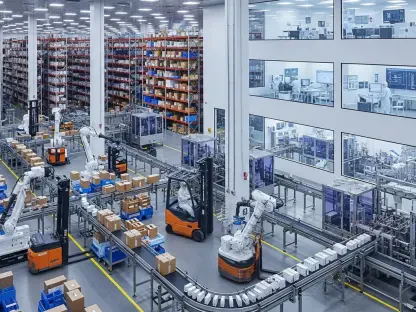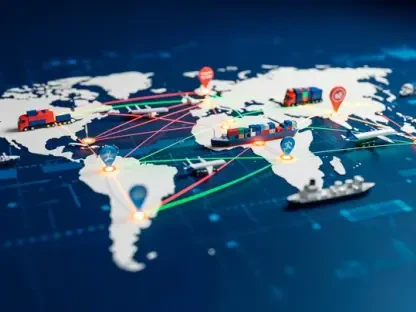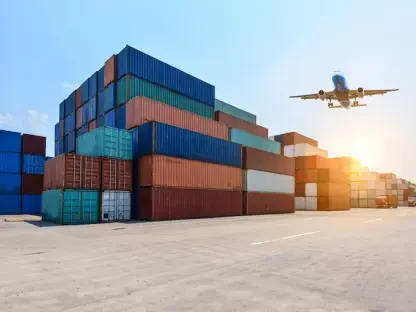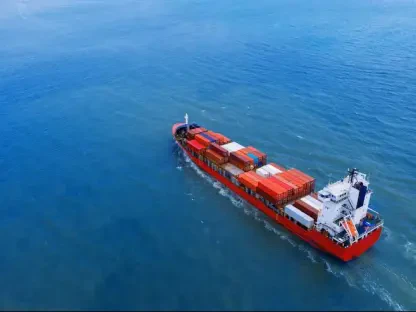In today’s business climate, sustainability is no longer just a buzzword; it’s a directive. Companies are increasingly faced with the challenge of reducing their carbon footprint to meet regulatory requirements and cater to a more environmentally conscious consumer base. Enter Mahindra Logistics Limited, a leader in green logistics, with their innovative ‘Emission Analytics Report’. This digital platform is designed to help businesses monitor and minimize their carbon emissions, offering a path toward a more sustainable future.
Reducing carbon emissions has become a top priority for businesses across various industries. Companies are under constant pressure to comply with regulatory requirements and to show their commitment to environmental responsibility to an increasingly discerning customer base. Mahindra Logistics Limited is stepping up to this challenge with the launch of its ‘Emission Analytics Report’, a pioneering tool aimed at enabling businesses to track and minimize their greenhouse gas emissions. This initiative is part of Mahindra’s larger strategy to develop a green logistics ecosystem focused on sustainability and operational efficiency.
The Power of Real-Time Emission Tracking
Tracking carbon emissions is a daunting task, especially for global companies with complex supply chains. Mahindra Logistics’ Emission Analytics Report simplifies this with its real-time visualization capabilities. The platform provides detailed insights into Scope 3 emissions, which include all indirect emissions that occur in a company’s value chain. Businesses can now visualize their emissions data, including metrics like emissions intensity, tonne-kilometers, and fuel usage.
The real-time tracking feature is invaluable for businesses striving to make immediate adjustments to their operations. For instance, companies can identify which stages of their supply chain are most carbon-intensive and target measures to reduce these emissions. This can be particularly useful for industries such as auto, manufacturing, and consumer goods, where supply chains are often extensive and complex. By offering granular details down to the shipment level, the Emission Analytics Report enables companies to make data-driven decisions. This level of insight is crucial for setting realistic sustainability goals and monitoring progress over time.
Moreover, the ability to track Scope 3 emissions is a significant advantage for companies aiming to improve their overall sustainability. Scope 3 emissions cover all indirect emissions, including those in an organization’s supply chain and from the usage of sold goods and services. These are often the most significant portion of a company’s carbon footprint and the hardest to measure. Mahindra Logistics’ tool offers an effective way to quantify these emissions, thereby providing businesses with a comprehensive view of their environmental impact. This holistic approach allows for better planning and implementation of emission reduction strategies.
A Comprehensive Green Logistics Ecosystem
The Emission Analytics Report is not a standalone tool but part of Mahindra Logistics’ broader green logistics ecosystem known as Edel. Initially launched as a green last-mile cargo delivery service, Edel has expanded to include other sustainable logistics solutions such as carbon-neutral warehousing and a fleet of electric vehicles. This integrated approach ensures that businesses can adopt sustainable practices at every step of their logistics journey.
For example, carbon-neutral warehousing solutions allow companies to mitigate the carbon footprint of their storage facilities. Warehousing is an often overlooked but significant contributor to a company’s overall emissions. By transitioning to carbon-neutral options, businesses can drastically cut down their carbon output. Additionally, the use of electric vehicles in logistics and transportation reduces reliance on fossil fuels. This not only contributes to lowering emissions but also offers cost savings in the long run, given the rising costs of traditional fuels. Industries like retail, FMCG, and e-commerce can particularly benefit from such green logistics solutions, given the high demand for rapid and efficient deliveries.
Expanding the green logistics ecosystem further, Mahindra Logistics offers a suite of services that enable businesses to seamlessly integrate sustainability into their supply chain operations. Carbon-neutral warehousing solutions, for instance, provide a practical way for companies to reduce their operational carbon footprint. Warehouses play a critical role in logistics operations, and transitioning to carbon-neutral facilities can have a substantial impact on a company’s overall emissions. In addition to warehousing, the move towards using electric vehicles for logistics and transportation presents an effective strategy to replace traditional fuel-based methods. This shift not only aids in reducing emissions but also aligns with long-term financial benefits, as electric vehicles tend to have lower operational costs.
User-Friendly and Accessible Technology
One of the standout features of the Emission Analytics Report is its user-friendly interface and accessibility. The platform operates on a Software-as-a-Service (SaaS) model, making it easily accessible from any web or mobile device. This ensures that businesses of all sizes can integrate this tool into their existing systems without requiring extensive technological upgrades. The fully automated nature of the platform simplifies the process of data collection and reporting. Businesses can easily access their emissions data in real-time, allowing for quick decision-making and adjustments. The platform’s accreditation by the Global Logistics Emission Council (GLEC) and ISO 14083 also provides an added layer of credibility and assurance to its users.
This ease of use is crucial for businesses operating across various sectors such as pharmaceuticals, mobility, and freight forwarding, where operational efficiency is key. The versatility of the tool ensures that it can be tailored to meet the specific needs of different industries, making it a valuable addition to any company’s sustainability toolkit. The SaaS-based platform’s design prioritizes user convenience without compromising on the depth of insights it offers. Companies can seamlessly incorporate this tool into their existing workflows, avoiding the need for extensive retraining or additional IT infrastructure.
Furthermore, the real-time nature of the data streamlines the process of tracking and managing emissions, thereby enabling businesses to be more agile and responsive in their sustainability efforts. The platform’s comprehensive metrics provide detailed insights that support strategic planning and operational adjustments. The fact that the Emission Analytics Report is fully automated further reduces the administrative burden on businesses, allowing them to focus on implementing actionable solutions based on the data. The credibility offered by GLEC and ISO 14083 accreditation assures businesses that they are utilizing a reliable and industry-standard tool for their emissions tracking and reduction efforts.
Facilitating Compliance and Low-Carbon Decisions
In an era where regulatory compliance is more critical than ever, the Emission Analytics Report offers significant advantages. The tool assists businesses in meeting Business Responsibility and Sustainability Reporting (BRSR) requirements and other environmental regulations. This is particularly important as governments worldwide are tightening regulations around carbon emissions and environmental impact. By providing detailed emissions tracking at the shipment level, the Emission Analytics Report enables businesses to generate comprehensive reports for regulatory purposes. This not only simplifies compliance but also enhances transparency, building trust with stakeholders and consumers alike.
Furthermore, the tool supports low-carbon decision-making. Companies can use the data to identify opportunities for carbon reduction, such as switching to more sustainable modes of transport or optimizing their supply chain routes. This proactive approach can lead to significant carbon savings, aligning with the broader goal of achieving Net-Zero emissions. The regulatory landscape is constantly evolving, and businesses must be agile to keep up with the changing requirements. Tools like the Emission Analytics Report not only help in compliance but also provide a competitive edge by showcasing the company’s commitment to sustainability.
The platform’s capability to facilitate low-carbon decision-making empowers businesses to implement practical measures that contribute to overall carbon reduction. For example, businesses can utilize the insights gained from the Emission Analytics Report to identify high-emission stages in their supply chains and devise strategies to mitigate these. This could involve transitioning to electric vehicles for certain delivery routes or selecting more sustainable suppliers. The detailed data provided by the platform supports informed decision-making, allowing companies to make strategic adjustments that yield significant environmental benefits. By integrating these insights into their operational planning, businesses can take proactive steps towards sustainability, reducing their carbon footprint and enhancing their corporate reputation.
Commitment to a Sustainable Future
In today’s business world, sustainability is more than just a trendy term; it’s a crucial directive. Companies are increasingly challenged to reduce their carbon footprints to comply with regulations and appeal to eco-conscious consumers. Mahindra Logistics Limited, a leader in green logistics, addresses this need with its innovative ‘Emission Analytics Report’. This advanced digital platform assists businesses in monitoring and minimizing their carbon emissions, guiding them toward a more sustainable future.
Reducing carbon emissions is now a top priority for businesses across numerous industries. Companies face relentless pressure to adhere to regulatory standards and demonstrate environmental responsibility to a growing base of discerning customers. Mahindra Logistics Limited rises to this challenge with its ‘Emission Analytics Report’, a groundbreaking tool designed to help businesses track and minimize their greenhouse gas emissions. This initiative is integral to Mahindra’s broader strategy of cultivating a green logistics ecosystem that prioritizes both sustainability and operational efficiency.









